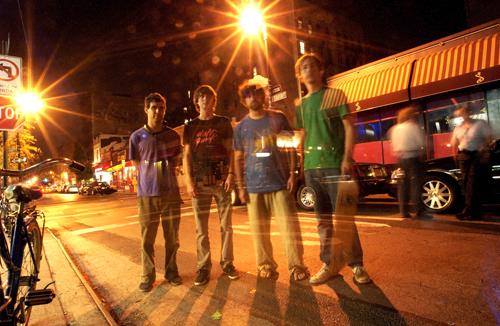Don’t call them weirdos: Animal Collective aims for futuristic sounds, alien pop tunes

Music group Animal Collective is photographed in New York, Oct. 4. From left are Dave Portner, Noah Lennox, Brian Weitz and Josh Dibb. Jim Cooper, The Associated Press
October 11, 2007
NEW YORK – They’ve been called weirdos, freaks and Satanists.
Animal Collective’s otherworldly song structures, deconstructed harmonies and tribal rhythms aren’t always met with receptive ears, but there might not be a more progressive band in indie music.
With two of the best-reviewed albums of the year – the band’s new “Strawberry Jam” and the solo disc by keyboardist Panda Bear, “Person Pitch” – Animal Collective has established itself as an act wildly separate from the many retro-oriented bands that populate today’s scene.
The sound of the future, the psychedelic band acknowledges, is something they seek.
“That’s kind of always been a goal, to do something that we feel is missing,” says Dave Portner, who goes by the name Avey Tare and is – at least on “Strawberry Jam” – the closest thing Animal Collective has to a lead singer.
Get The Daily Illini in your inbox!
“Even when we were younger, when we first started recording, it was real important to us,” Portner adds. “There was just something lacking for us in the music during the late ’90s and what was around us. We really wanted something that was new, something that wasn’t there.”
Animal Collective is a group of four twenty-something musicians, all of whom have pseudonyms: Portner, keyboardist and sometimes drummer Noah Lennox (Panda Bear), electronic programmer Brian Weitz (Geologist) and guitarist Josh Dibb (Deakin).
Though its members are free to drop in and out from time to time (Dibb is absent on “Strawberry Jam”), at the center of Animal Collective is the songwriting and singing duo of Lennox and Portner.
Though both are quiet, even shy off stage, they constitute the angelic and devilish sides of Animal Collective – a duality perhaps best demonstrated by the skeletons dressed in ballet tutus that adorn the stage on their current tour.
Lennox brings ethereal, reverb-drenched falsetto to the mix. “Person Pitch,” his third but easily most-noticed solo disc, showed what Lennox sounds like without his writing partner. His warm melodies – brought to culmination on the transcendent single “Bros” – recall a kind of fractured Beach Boys.
“I don’t like the scary movies,” says Lennox, who lives with his wife and child in Portugal. (The pair collaborates by sending each other tapes before the band meets to record).
Portner, however, is a horror film fanatic, a sensibility seen in the band’s music videos. His voice is more dynamic than Lennox’s, and often jumps unpredictably from anthemic harmony to screeches and snarls.
Weitz fills in the sonic textures with loops, samples and various electronica. “Strawberry Jam” was envisioned as an alien landscape.
“We wanted to sound futuristic,” says Weitz.
On the album opener and first single, “Peace Bone,” Portner sings: “An obsession with the past is like a dead fly/ Only few things are related to the ‘old times.'”
“I try not to be too much of a nostalgic person. I think it’s kind of sad sometimes,” says Portner. “For us, especially with the band, it’s good to just move on, move forward.”
All four grew up in Baltimore, where Portner recalls playing makeshift shows in the worst parts of town because there wasn’t a professional venue for indie or punk bands.
“Just an open mind and a love of music is what we all had,” Weitz says of their early bond.
They began as a group in earnest around 2000, soon after they all ended up in New York, where Portner and Dibb remain. Their first three studio albums were small releases that drew little notice, which Weitz (who now lives in Washington D.C.) believes helped incubate their experimental approach.
“Sung Tongs,” released in 2004, was Animal Collective’s breakthrough and it landed on many top ten lists for the year, including those by The New York Times and Pitchforkmedia.com. The disc featured Portner and Lennox’s skill at making old instruments sound new. On “Sung Tongs,” acoustic guitars dominate, most notably on the single “Who Could Win a Rabbit,” where even just the hand-clapping bridge (if you can call it that) seemed radically new.
As if shedding skin, those instruments were soon largely abandoned for others that would force new approaches. In 2005, the band released “Feels” to general acclaim, but the relatively more simple, stripped-down “Strawberry Jam” has further increased their audience.
Early on, Animal Collective grew a reputation as a unique concert experience. Operating in reverse of most bands, the group often performs new songs before they’re recorded: the best tour of “Strawberry Jam” material may have been last year (Animal Collective recently concluded a U.S. tour with two sold-out New York shows, and will embark on a European tour this month).
Writing in the Times, Wilco’s Jeff Tweedy said of an Animal Collective concert: “It was inspiring, one of the more memorable shows I’ve seen in the last five years.”
The masks that Animal Collective wore in early concerts – as well as their videos, pseudonyms and unconventional music – have contributed to a frequent label of “weird.”
“I really don’t like it,” says Lennox. “I feel like it’s kind of a lazy thing to do, just write something off as weird. I feel like it sells it short.”
Animal Collective is already off in a new direction, playing songs of a yet another new variety in concert. The band sounds still unsure of how to describe the latest evolution, but says it’s another step in trying to make electronic sounds organic.
“I’d like to think that we can always do something better,” says Lennox. “The moment where we’re like ‘That’s the best we got,’ I feel like we’re kind of dead at that point.”






